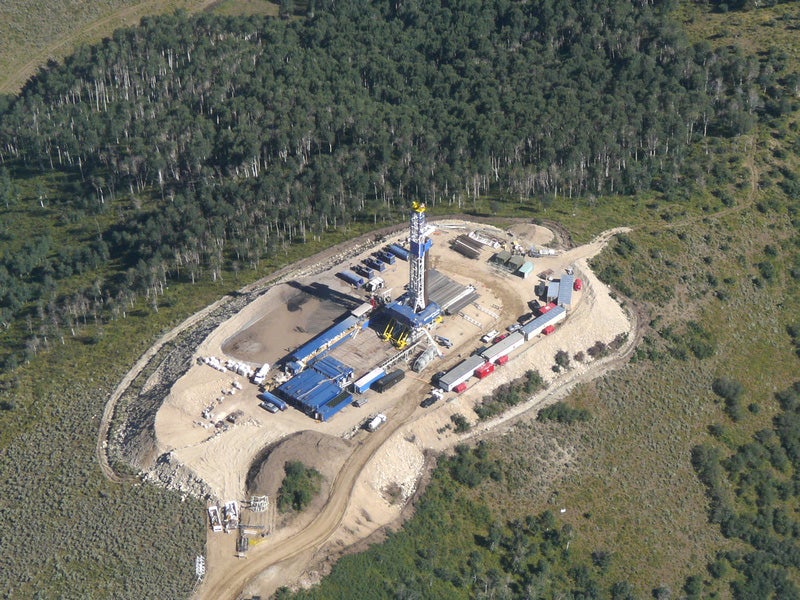Colorado Tackles Rules Governing Oil, Gas
Colorado has emerged as a western ground zero in the fracking boom, with more than 50,000 active wells in the state and 3,000 wells permitted annually on average in recent years. The state is struggling to deal with this staggering growth as well as the changing nature of the industry as operations have moved into

This page was published 12 years ago. Find the latest on Earthjustice’s work.
Colorado has emerged as a western ground zero in the fracking boom, with more than 50,000 active wells in the state and 3,000 wells permitted annually on average in recent years. The state is struggling to deal with this staggering growth as well as the changing nature of the industry as operations have moved into communities along the Front Range.
This week, Colorado is poised to take a big step forward on protecting public health as the state considers significant revisions to the rules controlling the air quality impacts of oil and gas industry operations. Earthjustice and our partners will be there, urging the state to stand strong against an industry campaign to water down the rules.
The Colorado Air Quality Control Commission will hold hearings starting on Wednesday on proposed rule revisions unveiled last November by Governor Hickenlooper. The proposed rules, while not perfect, start the state down a path towards protecting Colorado’s families and communities from the impacts of the fracking boom. We are hopeful that the Commission will accept and strengthen the proposal and adopt revised rules that will make all Coloradans proud.
The Governor’s proposal would make Colorado the first state in the nation to regulate methane emissions and would impose state-wide leak detection and repair requirements on the oil and gas industry. Both of these measures are important and necessary steps if Colorado is going to meaningfully deal with the impacts of fracking along the Front Range, on the Western Slope and in the Four Corners region.
Methane, which makes up approximately 80 percent of what comes out of the ground as “natural gas,” is a powerful global warming pollutant. Although it burns cleaner than coal, when released into the air unburned—such as when leaked from production facilities—it has up to 86 times the short-term global warming potential of carbon dioxide.
In addition to methane, the oil and gas industry emits a host of toxic chemicals, notably volatile organic compounds (VOCs). VOCs react with other compounds to form ground-level ozone, or as it is more commonly known, smog. Even in small concentrations smog makes breathing difficult, aggravates asthma, and can cause long-term lung damage; it is especially dangerous to at-risk groups including children and the elderly.
The valley below the Roan Plateau is dotted by oil and gas development. (Ecoflight)
The oil and gas industry is the state’s largest source of volatile organic compounds. Smog has traditionally been an urban issue, notably as a component of the Front Range’s brown cloud, but in the last decade hazardous levels have also been observed in rural communities associated with the West’s fracking boom.
The Governor’s proposal would point Colorado in the right direction to address both the short-term public health impacts of industrial oil and gas development and the long-term climate change impacts that result from emitted methane. Our attorneys Michael Freeman and Robin Cooley will speak in favor of the proposal but will also call on the Commission to make some further improvements so that the revised rules truly protect public health.
We, along with our clients, are particularly concerned that, despite the fact that the state recognizes that the Front Range fails to meet federal public health standards for ozone, the proposal is silent on whether the changes to the rules are sufficient to solve this problem.
Freeman and Cooley will urge the Commission to direct state regulators to conduct further research into the projected benefits of the rules considering the ongoing fracking boom and to establish a protocol for adjusting the requirements if the rules will fall short of what is needed. This approach, along with some targeted changes to leak detection and repair rule requirements, will provide for a meaningful long-term solution.
It is also imperative that all Coloradans benefit from the revised rules. Although the rules were developed in cooperation with three oil and gas companies who together control nearly 20,000 producing wells in Colorado, the powerful industry trade groups Colorado Oil and Gas Association and Colorado Petroleum Association have launched a campaign to cripple the proposed protections. These business interests are fighting hard to restrict the scope of the rules to Front Range communities and large operators.
Earthjustice believes that all Coloradans, not just those in the urban corridor, deserve clean air. It shouldn’t matter where you live or who is drilling in your community—your air should be protected. Freeman and Cooley will be speaking out against the arbitrary restriction of the rules and in favor of clean air for all.
The public is invited to comment on the proposed rule revisions during the first day of the hearings. Come on out and speak for clean air in your community!
A decision on the revision to the rules is expected immediately following the hearings. We are optimistic that we will be able to report back in a week and that Colorado will have taken a giant stride forward for clean air.
Follow Doug on Twitter at @dpflugh_ej
Earthjustice’s Rocky Mountain office protects the region’s iconic public lands, wildlife species, and precious water resources; defends Tribes and disparately impacted communities fighting to live in a healthy environment; and works to accelerate the region’s transition to 100% clean energy.